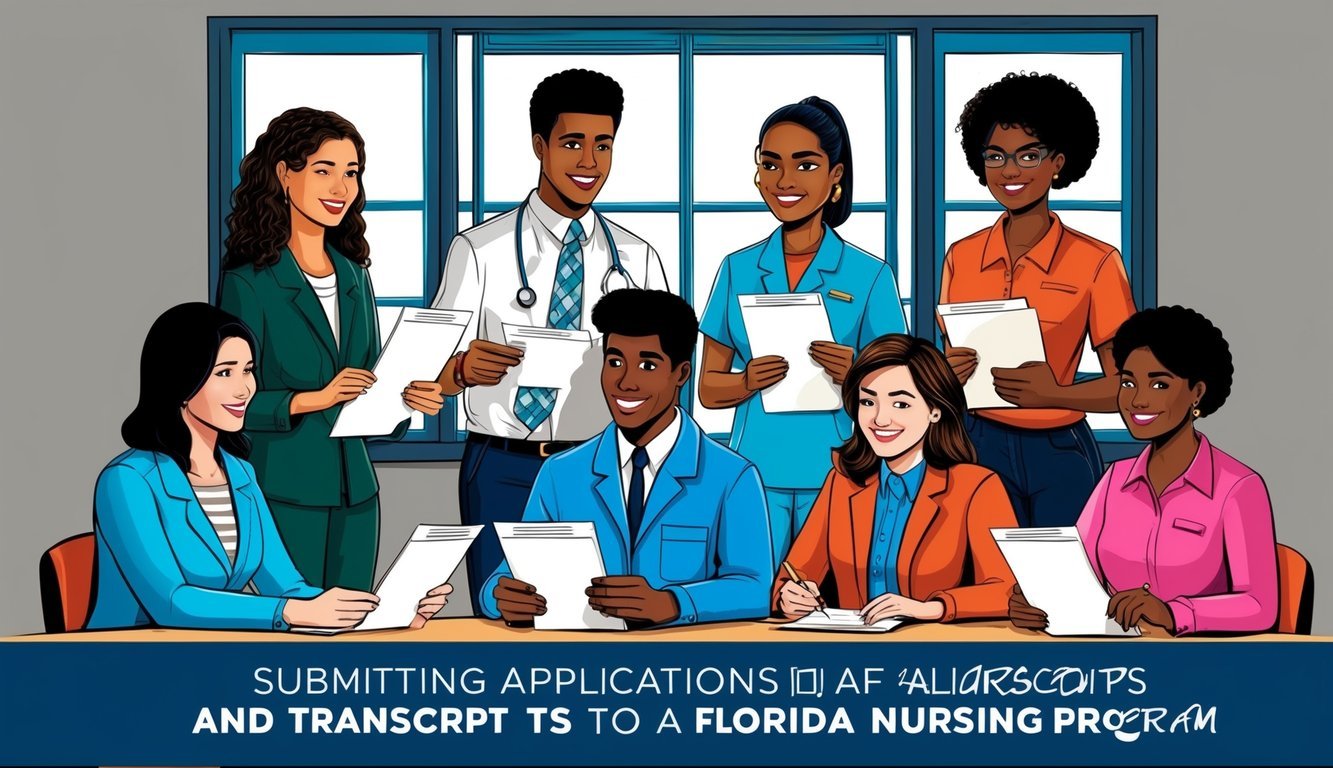If you are looking to enter the nursing profession quickly, a 12-month accelerated nursing program in Florida may be the perfect fit.
These programs are designed for individuals who already hold a degree in another field and wish to earn their Bachelor of Science in Nursing (BSN) in a fraction of the time compared to traditional programs.
With options available across various universities, you can complete your degree and be ready to take the NCLEX-RN exam in just one year.
The accelerated BSN programs in Florida combine rigorous coursework with hands-on clinical experience, ensuring that you gain the essential skills needed to excel in nursing.
Institutions like the University of Florida and Jacksonville University offer tailored programs that provide not only academic knowledge but also valuable clinical practice.
Engaging in such an accelerated nursing path can significantly enhance your career opportunities, allowing you to enter a high-demand field sooner.
As you consider your options, it’s beneficial to research the details of each program, including prerequisites, tuition costs, and start dates.
Exploring resources like Nurse.org can provide insights into which program aligns best with your career goals.
With the right information, you can make an informed decision that sets you on the fast track to becoming a registered nurse.
Overview of Accelerated BSN Programs
Accelerated BSN programs provide a fast-track option for individuals aiming to enter the nursing field.
These programs cater to those who already hold a bachelor’s degree in a different field, allowing you to transition to a nursing career in a condensed timeframe.
Understanding Accelerated BSN
Accelerated Bachelor of Science in Nursing (ABSN) programs are designed to be completed in 12 to 18 months.
They combine rigorous coursework with clinical experience, ensuring you gain the necessary skills quickly.
Typically, these programs require candidates to have completed specific prerequisite courses.
Admission criteria can be competitive, often looking for strong academic backgrounds.
Institutions offer various formats, including full-time and part-time options, depending on your needs and schedule.
Statistics and Trends in Nursing Education
Recent statistics indicate a growing demand for registered nurses (RNs).
The U.S. Bureau of Labor Statistics projects a 9% growth in RN employment from 2020 to 2030, highlighting the significance of nursing education.
The average annual salary for RNs is approximately $89,000, making this career path attractive.
Many schools in Florida have expanded their ABSN offerings in response to this demand.
With 12 programs available statewide, students can leverage various options to find a curriculum that fits their goals.
Programs typically average around 120 credits, making them feasible for those who have previously completed a bachelor’s degree.
Benefits of an Accelerated Nursing Degree
Enrolling in an accelerated nursing program offers several advantages:
- Quick Entry: You can enter the nursing profession within a year, bypassing the longer duration of traditional BSN programs.
- Diverse Career Options: A BSN opens doors to various nursing roles, including bedside nursing, management, and specialized fields.
- Job Market Readiness: These programs’ intensive nature prepares you for the fast-paced healthcare environment.
By completing an accelerated nursing degree, you position yourself as a competitive candidate in a growing field, ready to take on the challenges of modern healthcare.
For more information, you can explore resources like Nurse.org and NursingProcess.org.
Admission Requirements and Process

Understanding the admission requirements and process for 12-month accelerated nursing programs in Florida is essential for prospective students.
Each program has specific criteria, key application components, and a selection process to ensure that qualified candidates are chosen for this intensive training.
Admission Criteria and Prerequisites
To apply for these programs, you must meet certain admission criteria.
Typically, programs require a cumulative GPA of at least 3.0.
You may also need a prerequisite GPA that reflects your performance in foundational courses.
Many applicants possess a second bachelor’s degree or a related background, but some programs allow candidates with a first degree in non-nursing fields.
Official transcripts from all previous institutions are essential.
Additionally, you may be asked for letters of recommendation from academic or professional references.
Application Components and Deadlines
Your application will generally consist of several key components.
Commonly required documents include:
- Official transcripts
- Resume
- Writing sample
- Letters of recommendation
Most programs open their application process several months in advance, often in the spring or summer preceding the start date.
Be mindful of application deadlines, which can vary by institution.
Check specific program websites for exact dates to ensure you submit all materials on time.
Selection Process and Interview
The selection process for accelerated nursing programs often includes a virtual interview.
This step assesses your fit for the program and allows you to demonstrate your communication skills.
Be prepared to discuss your background and motivation for pursuing nursing.
After initial reviews, applicants may undergo a background check and fingerprinting to meet state requirements.
Following the interviews, the admissions committee will review all components, including your application, transcripts, and interview performance, to make final decisions.
Curriculum and Clinical Training

The curriculum of a 12-month accelerated nursing program is designed to provide you with essential knowledge and skills.
The program includes a robust blend of theoretical courses and hands-on clinical training, ensuring you are well-prepared for a nursing career.
Emphasis is placed on foundational subjects and immersive learning experiences.
Accelerated Curriculum Structure
The accelerated curriculum consists of intensive coursework that covers critical areas in nursing.
You can expect courses in anatomy and physiology, microbiology, nursing fundamentals, and nutrition.
| Course Title | Key Topics Covered |
|---|---|
| Anatomy and Physiology | Human body systems, organ function |
| Microbiology | Pathogens, infection control |
| Nursing Fundamentals | Basic nursing skills, ethics |
| Nutrition | Dietary needs, patient education |
This structured approach allows you to grasp essential concepts quickly while integrating knowledge across subjects.
Courses are designed to reinforce each other, forming a comprehensive understanding of patient care.
Clinical Partnerships and Experiences
Clinical training is an integral aspect of your education.
The program typically involves partnerships with local hospitals and healthcare facilities, providing you with real-world experience through clinical rotations.
During these rotations, you will have the opportunity to apply your classroom learning in various medical settings.
You may work alongside experienced nurses and other healthcare professionals, allowing you to observe best practices and hone your skills in patient care.
Innovative Learning: Simulations and Labs
To enhance your practical skills, many programs incorporate cutting-edge simulations and lab experiences.
In simulation labs, you will engage in realistic nursing scenarios, allowing you to practice critical thinking and decision-making under pressure.
These immersive learning experiences help bridge the gap between theory and practice.
You can gain confidence in your abilities while receiving immediate feedback from instructors.
Incorporating psychology into patient interactions and understanding diverse healthcare needs are also emphasized during these simulations.
Affiliated Universities and Colleges

Florida offers several outstanding universities and colleges with 12-month accelerated nursing programs.
These institutions provide diverse pathways to earn a Bachelor of Science in Nursing (BSN), catering to the needs of non-nursing graduates seeking to enter the healthcare field swiftly.
University of Miami Nursing Programs
The University of Miami offers a 12-month accelerated Bachelor of Science in Nursing program through its School of Nursing and Health Studies.
This rigorous program is designed for individuals who already hold a bachelor’s degree in another field.
Key features include:
- Program Duration: 12 months
- Format: Full-time, allows for immersive clinical experiences
- Clinical Partnerships: Collaborations with local hospitals enhance hands-on learning
The curriculum focuses on evidence-based practices, preparing you to meet the demands of modern healthcare environments.
For more information, visit the University of Miami Nursing Programs.
University of Florida College of Nursing
The University of Florida’s College of Nursing provides a competitive 12-month accelerated BSN program aimed at graduates from various academic backgrounds.
It’s known for its high standards and extensive resources.
Program highlights include:
- Clinical Placement: Opportunities at UF Health and other local facilities
- Support Services: Access to academic advising and tutoring
- Accreditation: Recognized by the Commission on Collegiate Nursing Education
This program prepares you for licensure as a registered nurse (RN), focusing on both theoretical knowledge and practical skills.
Explore more details at the University of Florida College of Nursing.
Jacksonville University’s Keigwin School of Nursing
Jacksonville University offers a unique 12-month accelerated BSN program through the Keigwin School of Nursing, which emphasizes a community-focused approach.
Key aspects include:
- Accelerated Format: Intensive, cohort-based learning
- Clinical Experience: Students engage with Mayo Clinic and other local healthcare providers
- Community Health: Opportunities to participate in various community service projects
This program melds academic rigor with real-world application, essential for effective nursing practice.
Learn more by visiting the Keigwin School of Nursing.
University of Central Florida Nursing Options
The University of Central Florida (UCF) delivers a 12-month accelerated BSN program designed for students with a previous degree.
The program is located at UCF’s College of Nursing.
Features to consider include:
- Simulation Labs: State-of-the-art facilities for hands-on training
- Flexible Schedule: Courses are available in both day and evening formats
- Diversity of Clinical Settings: Experience in a range of healthcare environments
The UCF nursing program is known for its comprehensive approach to nursing education, equipping you for various nursing roles.
More information is available at the University of Central Florida Nursing.
Florida State University Options for Nursing
Florida State University (FSU) offers a 12-month accelerated Bachelor of Science in Nursing program through its College of Nursing, which is tailored for non-nursing graduates.
Important elements include:
- Curriculum Emphasis: Focuses on critical thinking and leadership skills
- Accreditation: Program accredited by CCNE
- Diverse Partnerships: Offers clinical rotation options in many healthcare facilities across the state
As an FSU student, you gain access to rich learning experiences and clinical practice that prepare you for the NCLEX exam and a career in nursing.
Discover more at the Florida State University College of Nursing.
Licensure and Post-Graduation Opportunities

In pursuing a 12-month accelerated nursing program in Florida, you will encounter significant opportunities for licensure and career advancement.
Understanding the steps you need to take after graduation can better prepare you for the next phases of your nursing career.
Preparing for the NCLEX-RN Exam
After you complete your accelerated nursing program, you can take the NCLEX-RN exam.
You need to pass this exam to get your registered nurse (RN) license.
To prepare effectively:
- Review Course Material: Focus on key nursing concepts, pharmacology, and patient care.
- Practice Questions: Use NCLEX review books and online practice tests.
- Study Groups: Collaborate with classmates for shared learning.
Passing the NCLEX-RN shows that you’re ready to provide safe and effective nursing care in various clinical settings.
Advancing from RN to BSN
Once you’re a licensed RN, you might consider furthering your education with an RN-to-BSN program.
This baccalaureate degree equips you with advanced skills needed in today’s healthcare environment.
Several benefits include:
- Career Growth: Many employers prefer or require a BSN for leadership roles and specialized positions.
- Expanded Knowledge: A BSN curriculum often covers topics such as critical care and community health.
You can explore various online options that allow for flexible learning while you work in nursing practice, making this transition smoother.
Career Prospects and Continuing Education
After you obtain your RN license, you will have many career options.
As a registered nurse, you can work in various environments.
These include hospitals, outpatient clinics, and long-term care facilities.
Continuing education is also important.
Pursuing certifications in areas such as critical care or obtaining advanced practice credentials can enhance your job prospects and salary potential.
The healthcare field is always evolving.
Staying updated with the latest practices ensures you provide the best hands-on care to your patients.
Engaging with nursing faculty and professional nursing organizations can help you stay informed about new opportunities and resources.

